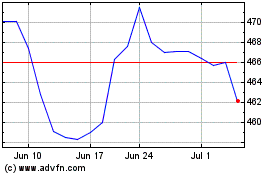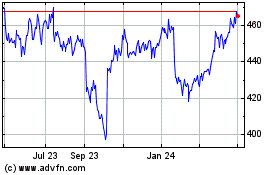By Vipal Monga and Nina Trentmann
To help shield themselves from the economic damage caused by the
coronavirus pandemic, some big U.S. manufacturers are trying
something different: They are paying their bills early.
Businesses such as Lockheed Martin Corp. and Micron Technology
Inc. that depend on complex global networks for parts and services
are worried the prolonged economic slowdown could disrupt their
supply chains. Looking to deepen ties with their suppliers, reduce
risks or grab market share, the companies are pumping money to
smaller businesses that could fail otherwise.
Perfekta Inc., a Wichita, Kan., aerospace company, received a
lifeline in early June, when Lockheed started paying its invoices
in half the time it usually takes, said Brian Bentley, Perfekta's
vice president of operations.
The maker of jet parts had already laid off 15% of its roughly
200 workers when Lockheed's payments arrived early. "This was a
pleasant surprise," Mr. Bentley said. After the cash injection,
Perfekta avoided cutting more jobs and continued making the parts
that Lockheed needs to keep its jet fighters rolling off the
assembly line.
During the second quarter, Lockheed accelerated payments
totaling about $1.3 billion to its supplier network, said Lockheed
finance chief Ken Possenriede. "We have given priority to small and
vulnerable suppliers," he said.
Such moves go against the tide of a cash-management practice
that has gained strength in many corporate treasury departments in
recent years. It is more common for companies to delay payments to
boost short-term capital they can then use for other investments.
That is especially true in times of crisis.
On average, the 849 largest nonfinancial U.S. companies took 60
days in the second quarter to pay suppliers -- a 10-year record --
according to Hackett Group, a consulting firm. The average rose 10%
from a year earlier, when U.S. companies took about 54.7 days to
pay.
Much of the recent increase is being driven by retailers,
airlines and industries that have been hurt by the pandemic.
JetBlue Airways Corp., for example, is pushing its suppliers to
take payments 90 to 120 days after invoicing, up from an average of
30 days.
"That helps you reduce your cash burn," said JetBlue Chief
Financial Officer Steve Priest, who said he isn't concerned about
the financial health of the supplier network. "We drive a hard
bargain at JetBlue."
The flexibility that extended payment terms give JetBlue and
others comes at the expense of suppliers. Those smaller companies
are often forced to tie up more of their own cash in receivables or
to eat interest costs. In some cases, the stress is too much to
bear.
Sportswear-technology company Hologenix LLC was forced into
bankruptcy protection this April when sportswear brand Under Armour
Inc. doubled the number of days it took to pay its invoices to 90
days. "It was a tough situation," said Seth Casden, Hologenix's
founder.
Under Armour said it extended vendor payment terms as its own
customers delayed payments. "As our customers are now beginning to
pay us back on normal terms, we're simultaneously doing the same
with our vendors and suppliers," a company spokesman said.
During the pandemic, where the economic damage has spread
widely, there is more danger that squeezing suppliers can rebound
on companies, said Carlos Mendez, co-founder of Crayhill Capital
Management LP, a New York asset-management firm that invests in
supply-chain financing companies.
"Companies know it's a tenuous situation," Mr. Mendez said.
"They can't continue to extend payment periods so much that they
hurt themselves."
The Pentagon set up a program to pay its big contractors, such
as Lockheed and General Dynamics Corp., in advance so they could do
the same with suppliers. General Dynamics, which makes Abrams tanks
and Gulfstream business jets, now settles its bills as soon as it
gets its orders, instead of waiting as long as 60 days to pay its
invoices.
"We are in a symbiotic relationship," said Jason Aiken, General
Dynamics' finance chief. "Any failure can cause much greater
damage." The company plans to continue the early payments at least
until the end of the year, he said.
Micron, a computer-chip maker, relies on a complex network of
companies for chemicals, semiconductor raw materials and
manufacturing support. To protect those suppliers, Micron has been
paying some of them in 10 days, compared with a previous average of
about 50 days, said Chief Financial Officer David Zinsner. The
company has advanced about $200 million in supplier payments since
late March.
Like the defense contractors, Micron's business has fared well
despite short-term disruptions from the pandemic. The memory-chip
giant's fiscal third-quarter revenue rose 14% from a year earlier,
and it has forecast higher sales in the current quarter.
In some cases, suppliers are the ones giving their customers a
break. Garbage-collection and recycling company Waste Management
Inc. in March began reaching out to small and midsize customers in
the hard-hit restaurant, hotel and education sectors. Many needed
fewer garbage collections or a pause in service while their
businesses were locked down, and Waste Management obliged, said
Chief Executive Jim Fish.
Revenue for the company declined roughly $10 million in June and
July because it paused fees, reduced some prices and gave some
customers a free month of service. Mr. Fish said the company had
been paying down debt and building cash reserves to give it a
buffer for difficult times, and used some of it to help its
customers.
"We're not overly concerned about the cost," Mr. Fish said.
"This pays itself back over time."
Write to Vipal Monga at vipal.monga@wsj.com and Nina Trentmann
at Nina.Trentmann@wsj.com
(END) Dow Jones Newswires
September 10, 2020 09:14 ET (13:14 GMT)
Copyright (c) 2020 Dow Jones & Company, Inc.
Lockheed Martin (NYSE:LMT)
Historical Stock Chart
From Mar 2024 to Apr 2024

Lockheed Martin (NYSE:LMT)
Historical Stock Chart
From Apr 2023 to Apr 2024
